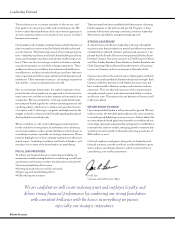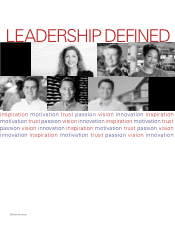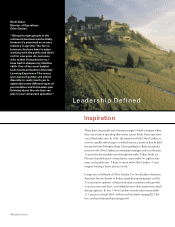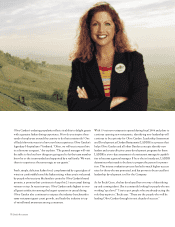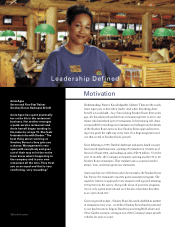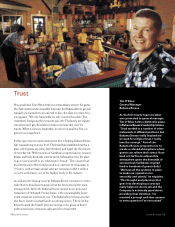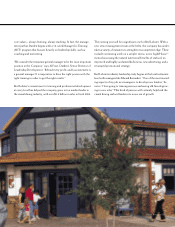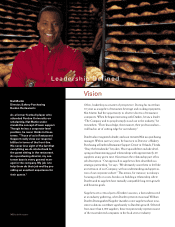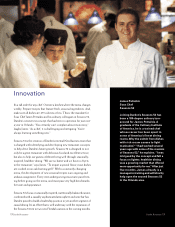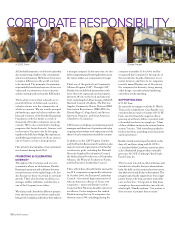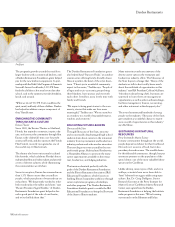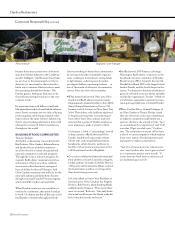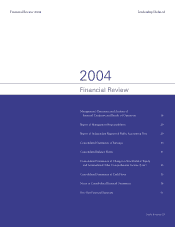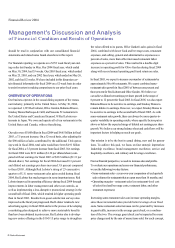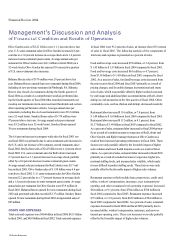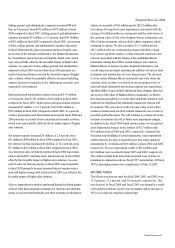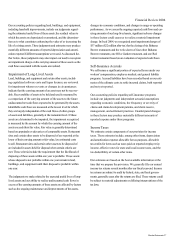Red Lobster 2004 Annual Report Download - page 18
Download and view the complete annual report
Please find page 18 of the 2004 Red Lobster annual report below. You can navigate through the pages in the report by either clicking on the pages listed below, or by using the keyword search tool below to find specific information within the annual report.
18
At Darden Restaurants, we believe leadership
also means being a leader in the communities
where we do business. We believe if you want
to make a difference in the world, you have
to be involved. The principle of community
responsibility has always been one of our core
values and a cornerstone of our corporate
culture, starting with our founder Bill Darden.
That’s why for more than a decade we’ve
poured millions of dollars and countless
volunteer hours into the communities in
which we operate. We use a multi-pronged
philanthropic approach that combines the
financial resources of the Darden Restaurants
Foundation with the hands-on work of
thousands of Darden volunteers across the
country. We’re also committed to funding
programs that foster diversity, fairness, and
inclusiveness. Because only by bringing
together the skills, knowledge, life experiences,
and differing perspectives of all our citizens
can we hope to create a lasting impact.
Here are just a few examples of our community
involvement during fiscal 2004.
PROMOTING&CELEBRATING
DIVERSITY
Throughout the Company and in every
community where we do business, Darden
Restaurants promotes and celebrates diversity…
not just because it’s the right thing to do, but
also because we know it’s critical to our future
growth. That’s why diversity excellence is a
strategic enabler at Darden, and diversity is
one of the Company’s core values.
We respect and cherish the different perspec-
tives and experiences our diverse employees
bring to the workplace and believe they make us
a stronger company. In the same way, we also
believe supporting and fostering diversity across
the nation makes our communities stronger.
That’s one of the goals of our Community
Alliance Program (CAP). Through CAP,
Darden has established partnerships with
more than 150 organizations that support
diversity efforts on the local and national
level, including the Urban League; NAACP;
National Council of LaRaza; The East Los
Angeles Community Union; National MBA
Association Recruitment; INROADS; the
United Negro College Fund; and African
American, Hispanic, and Asian American
Chambers of Commerce.
CAP focuses on helping our restaurant general
managers and directors of operations develop
ongoing relationships with organizations like
these in local communities around the country.
In addition to the CAP Program, Darden
and the Darden Restaurants Foundation also
support national organizations that further
our diversity goals, including the National
Minority Supplier Development Council;
the Multicultural Foodservice & Hospitality
Alliance; the Women’s Foodservice Forum;
and the Executive Leadership Council.
These efforts have placed Darden among the
top U.S. companies recognized for diversity.
In October 2003, the Executive Leadership
Council – the nation’s largest association of
African American officers of 100
companies – presented Darden with its
Corporate Best Practices Award for diversity
excellence; magazine has ranked
Darden among the top 50 companies for
diversity since 1999, including placing the
company at number 33 for 2004, and has
recognized the Company for having one of
the most diverse boards of directors in cor-
porate America; and magazine
recently named Darden one of 20 notewor-
thy companies for diversity, citing, among
other things, our multicultural marketing
and ethnic media spending.
SUPPORTINGKIDS
As a juvenile investigator with the Ft. Worth,
Texas, police department, Gary Randle, now
executive director and co-founder of H.O.P.E.
Farm, saw first-hand the negative effects
growing up without a father or positive male
role models can have on young boys. “Many
of these children end up in the criminal justice
system,” he says. “I felt something needed to
be done for them, something more than arrest
and incarceration.”
Randle started mentoring school kids on his
days off, and later, along with H.O.P.E.’s
co-founder Noble Crawford, started an after-
school basketball program that eventually
grew into H.O.P.E. (Helping Other People
Excel) Farm, Inc.
The two men restored an old crack house and
turned it into a facility that provides academic
help, life skills, and recreational activities every
day after school and all day in the summer. The
program specifically targets boys from single
parent homes who lack a positive male influ-
ence in their lives. “Our goal is to help these
young boys become productive men who do
what’s right,” Randle explains. “Our posture is
that it’s easier to prepare than to repair.”
CORPORATERESPONSIBILITY
H.O.P.E.Farm EnzianTheater


